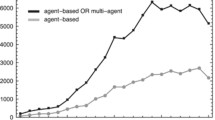Abstract
This year’s MABS workshop was the sixth in a series which is intended to look at “using multi-agent models and technology in social simulation,” according to the the workshop series homepage [1]. We feel that this is an appropriate time to ask the participants and the wider community what it is that they hope to gain from this application of the technology, and more importantly, are the tools and techniques being used appropriate for achieving these aims? We are concerned that in many cases they are not, and consequently, false or misleading conclusions are being drawn from simulation results. In this paper, we focus on one particular example of this failing: the consequences of the inappropriate use of numbers. The translation of qualitative data into quantitative measures may enable the application of precise analysis, but unless the translation is done with extreme care, the analysis may simply be more precisely wrong. We conclude that as a community we need to pay careful attention to the tools and techniques that we are using, particularly when borrowing from other disciplines, to make sure that we avoid similar pitfalls in the future.
Preview
Unable to display preview. Download preview PDF.
Similar content being viewed by others
References
Sichman, J.S.: Multi-agent-based simulation (MABS) – the international workshop series (2005), website http://www.pcs.usp.br/~mabs/
Gilbert, N., Conte, R., Sichman, J.S.: ICMAS 1998 workshop on multi-agent systems and agent-based simulation (MABS) (1998), website http://cress.soc.surrey.ac.uk/mabs98.html
de Jong, A., de Ruyter, K., Wetzels, M.: Antecedents and consequences of group potency: A study of self-managing service teams. Management Science 51, 1610–1625 (2005)
Hales, D.: Change your tags fast! a necessary condition for cooperation? In: Davidsson, P., Logan, B., Takadama, K. (eds.) MABS 2004. LNCS (LNAI), vol. 3415, pp. 89–98. Springer, Heidelberg (2005)
Laursen, K., Salter, A.: Open for innovation: the role of openness in explaining innovation performance among U.K. manufacturing firms. Strategic Management Journal 27, 131–150 (2006)
Sosa, R., Gero, J.S.: Social change: Exploring design influence. In: Hales, D., Edmonds, B., Norling, E., Rouchier, J. (eds.) MABS 2003. LNCS, vol. 2927, pp. 106–119. Springer, Heidelberg (2003)
Pfeffer, J., Fong, C.T.: The end of business schools? less success than meets the eye. Academy of Management Learning & Education 1 (2002)
Ghoshal, S.: Bad management theories are destroying good management practices. Academy of Management Learning & Education 4, 75–91 (2005)
Bennis, W.G., O’Toole, J.: How business schools lost their way. Harvard Business Review (2005)
Antunes, L., Balsa, J., Urbano, P., Moniz, L., Palma, C.R.: Tax compliance in a simulated heterogeneous multi-agent society. In: Sichman, J.S., Antunes, L. (eds.) MABS 2005. LNCS (LNAI), vol. 3891, Springer, Heidelberg (2006)
Melo, A., Belchior, M., Furtado, V.: Analyzing police patrol routes with the simulation of the physical reorganization of agents. In: Sichman, J.S., Antunes, L. (eds.) MABS 2005. LNCS (LNAI), vol. 3891, Springer, Heidelberg (2006)
Rodrigues, M.R., Luck, M.: Analysing partner selection through exchange values. In: Sichman, J.S., Antunes, L. (eds.) MABS 2005. LNCS (LNAI), vol. 3891, Springer, Heidelberg (2006)
Sultanik, E.A., Peysakhov, M.D., Regli, W.C.: Agent transport simulation for dynamic peer-to-peer networks. In: Sichman, J.S., Antunes, L. (eds.) MABS 2005. LNCS (LNAI), vol. 3891, Springer, Heidelberg (2006)
Edmonds, B.: Against the inappropriate use of numerical representation in social simulation. Technical Report 04-131, Centre for Policy Modelling (2004), available at http://cfpm.org/cpmrep129.html
Edmonds, B.: Assessing the safety of (numerical) representation in social simulation. In: Proceedings of the 3rd European Social Simulation Association conference (ESSA 2005), Koblenz, Germany (2005)
Academy of Management Review: Information for contributors. Academy of Management Review 30, 230 (2005)
Academy of Management Journal: Information for contributors. Academy of Management Journal 48, 179 (2005)
Strategic Management Journal website (2005), http://www3.interscience.wiley.com/cgi-bin/jabout/2144/ProductInformation.html
Administrative Science Quarterly website (2005), http://www.johnson.cornell.edu/publications/asq/contributors.html
Management Science website (2005), http://mansci.pubs.informs.org/amission.html
Hackman, J., Wageman, R.: A theory of team coaching. Academy of Management Review 30, 269–287 (2005)
Wageman, R.: How leaders foster self-managing team effectiveness: Design choices versus hands-on coaching. Organization Science 12, 559–577 (2001)
Cronbach, L.: Coefficient alpha and the internal structure of tests. Psychometrika 16, 297–333 (1951)
Cohen, S.G., Ledford Jr., G.E., Spreitzer, G.M.: A predictive model of self-managing work team effectiveness. Human Relations 49, 643–676 (1996)
Milton, L., Westphal, J.: Identity confirmation networks and cooperation in workgroups. Academy of Management Journal 48, 191–212 (2005)
Edwards, J.R.: The study of congruence in organizational behavior research: Critique and a proposed alternative. Organizational Behavior and Human Decision Processes 58, 51–100 (1994)
Edwards, J.R.: Alternative to difference scores: Polynomial regression analysis and response surface methodology. In: Drasgow, F., Schmitt, N. (eds.) Measuring and Analysing Behavior in Organizations: Advances in Measurement and Data Analysis, pp. 350–400. Jossey-Bass ( (2002)
Cohen, P.R.: Heuristic Reasoning about Uncertainty: An Artificial Intelligence Approach. Pitman, London (1985)
Author information
Authors and Affiliations
Editor information
Editors and Affiliations
Rights and permissions
Copyright information
© 2006 Springer-Verlag Berlin Heidelberg
About this paper
Cite this paper
Moss, S., Norling, E. (2006). Multi-Agent-Based Simulation: Why Bother?. In: Sichman, J.S., Antunes, L. (eds) Multi-Agent-Based Simulation VI. MABS 2005. Lecture Notes in Computer Science(), vol 3891. Springer, Berlin, Heidelberg. https://doi.org/10.1007/11734680_1
Download citation
DOI: https://doi.org/10.1007/11734680_1
Publisher Name: Springer, Berlin, Heidelberg
Print ISBN: 978-3-540-33380-7
Online ISBN: 978-3-540-33381-4
eBook Packages: Computer ScienceComputer Science (R0)




